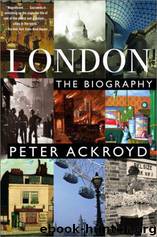London: The Biography by Peter Ackroyd

Author:Peter Ackroyd
Language: eng
Format: mobi, epub
Tags: London, British History, Biography
ISBN: 9780385497718
Publisher: Anchor
Published: 2000-01-01T15:00:00+00:00
CHAPTER 44
What’s New?
The crowd lives upon news and upon rumour. Elizabeth I recalled that, as a princess, she had asked her governess, “What news was at London?” On being told that it was rumoured she was about to marry Lord Admiral Seymour, she replied, “It was but a London news.” So in the sixteenth century “London news” was considered to be fleeting and inaccurate but, even so, the object of much curiosity. In King Lear the “poor rogues / Talk of Court news … who loses and who wins; who’s in, who’s out.” Shakespeare also invoked “the newes / Of hurly burly innovation” in Henry IV, Part One as well as “the new newes at the new Court” in As You Like It. It was often observed that, on entering a coffee house, the first and immediate enquiry was “What news? What news?”
The city is the centre of scandal, slander and speculation; the citizens are rumourmongers and backbiters. In the sixteenth century there were handbills and pamphlets and broadsheets devoted to the more sensational events of the day, and the street-sellers ensured that they were reported from door to door. In 1622 a weekly pamphlet of news was published in London, under the rubric of “Weekly Newes from Italy, Germanie, Hungary, Bohemia, the Palatinate, France and the low Countries etc.” Its success was such that it provoked the publication of many other weekly pamphlets which went under the common title of “Corantos.” The “news” was treated with great suspicion, however, as if the reports of London were based on faction or fractiousness. It was not an honest city and the editor of the Perfect Diurnal, Samuel Peche, was described in the 1640s as being “constant in nothing but wenching, lying and drinking.” He was, in other words, a typical Londoner.
There was one other aspect of London “news” which did not escape the attention of Ben Jonson. In his The Staple of Newes (1625) he suggests that news ceases to be “news” when it is printed and distributed; its essence is intelligence given in whisper or rumour, the kind of report that in the fifteenth or sixteenth centuries could permeate all London within a very short period. Jonson had his own view, then, of the “stationer” or publisher of news, who
knows Newes well, can sort and ranke ’hem
And for a need can make ’hem.
Download
This site does not store any files on its server. We only index and link to content provided by other sites. Please contact the content providers to delete copyright contents if any and email us, we'll remove relevant links or contents immediately.
Spell It Out by David Crystal(36117)
Underground: A Human History of the Worlds Beneath Our Feet by Will Hunt(12099)
A Year in the Merde by Stephen Clarke(5430)
Venice by Jan Morris(2574)
Claridge's: The Cookbook by Nail Martyn & Erickson Meredith(2404)
My Paris Kitchen: Recipes and Stories by Lebovitz David(2294)
A TIME OF GIFTS by Patrick Leigh Fermor(2206)
The Plantagenets by Dan Jones(2090)
Welcome to the Goddamn Ice Cube by Blair Braverman(2050)
The Finnish Way by Katja Pantzar(2001)
Top 10 Prague (EYEWITNESS TOP 10 TRAVEL GUIDES) by DK(1988)
Bang Poland: How To Make Love With Polish Girls In Poland by Roosh V(1983)
From Russia with Lunch by David Smiedt(1977)
The Isle of Mull by Terry Marsh(1948)
A TIME TO KEEP SILENCE by Patrick Leigh Fermor(1913)
Rick Steves London 2018 by Rick Steves & Gene Openshaw(1869)
Insight Guides Experience Tokyo by Insight Guides(1860)
A Taste of Paris by David Downie(1857)
Merde in Europe by Stephen Clarke(1772)
